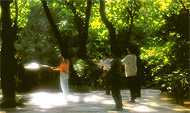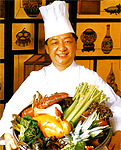Constitutional and Lifestyle Factors
While the main causes of body disharmony are external like the six evils or internal like the seven emotions, there are additional factors that need to be taken into consideration in disease causation. These factors are constitutional factors, lifestyle factor and unforeseen factors.
Constitutional Factors
TCM maintains that an individual's energy system are comprised of inborn qi and jing produced throughout life. Inborn qi represents our constitution, which depends on our parents. If inborn qi is deficient, the individual is more susceptible to the whole range of external and internal factors, which can possibly cause a disharmony. Therefore, if we believe that we have any constitutional weakness, we need to take particular care to ensure that any other potential causes of disharmony in our lives are avoided if at all possible.
Lifestyle Factors
TCM has always recognized the importance of "lifestyle factors" in the maintenance of good health and well being. This now has become the focus of Western medicine.
 |
Work |
| |
 |
| Too much physical work can impair the qi. |
The kind of work we do, or lack of it if unemployed, can profoundly influence our energy system. Too much physical work can impair the qi (vital energy), and with excessive lifting the lungs become deficient. Too much mental activity can damage the spleen and make the yin deficient. Someone who works outdoors, for example, is more liable to be at risk from cold, dampness, wind or heat evils. |
| |
|
 |
Exercise |
| |
 |
| Exercise is good for us in the right amounts. |
Exercise, if undertaken to an extreme can cause disharmony. For example, many athletes, who train to an excessive degree, appear very fit, but are often very susceptible to infections and injuries. In the long run they may become chronically qi (vital energy) deficient because of overstressing the kidneys. It will be noted that many Chinese exercise regimes such as qi-gong or taijichuan are not obviously aerobic in nature like many Western forms of exercise. These practices however, offer a more balanced approach to exercise consistent with the principles of TCM. It is evident that good health and longevity are notable in the practitioners of such activities. |
| |
|
 |
Diet |
| |
 |
| Diet is a common factor in disease development. |
Diet is afforded a very important place in Chinese medicine. See Chinese Functional Foods. The stomach and spleen have the responsibility for processing food and extracting the nutrient essence, which is then passed onto the lungs as a central part of the production of qi (vital energy) in the body. If the spleen has to work against poor and damaging foods, then it will suffer (especially from damp) and the body will deplete the qi (vital energy) of the body as a whole.
Balance rather than specific dietary instructions represents the Chinese approach to nutrition. If an individual follows a healthy and balanced diet, then the spleen will remain healthy and the qi (vital energy) of the body will be sufficient. The overemphasis on sweet and processed foods in many Western diets does not lend itself to such a balance. |
| |
|
 |
Sexual Activity |
| |
In TCM, excessive sexual activity is considered to be damaging to kidney jing and can lead to long-term deficiency problems. An excessive number of pregnancies can seriously deplete a woman's blood and jing. While there is much debate about what is considered excessive sexual activity, the Chinese system generally emphasizes a natural decline in this activity as part of the ageing process. |
|